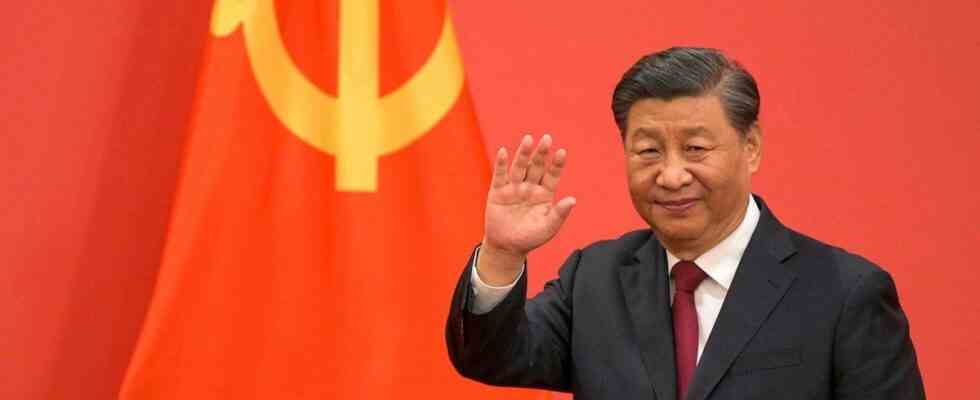Xi Jinping is now the most powerful Chinese leader since Mao Tse-tung. The president was reappointed, unsurprisingly, this Sunday at the head of the Chinese Communist Party (CCP), now made up of close allies. The Beijing strongman vowed to “work hard in fulfilling” his “tasks” immediately after being granted a third five-year term by a vastly revamped CCP Central Committee.
At the Grand Palace of the People in the capital, Xi Jinping, who has presided over China for ten years, arrived this Sunday at the platform surmounted by the sickle and the hammer. He was followed by six other men appointed to the top of Chinese power, all relatives and allies. He “sincerely thanked the whole Party for the trust placed in us”, the new leadership team. “China cannot develop without the world and the world also needs China,” said the leader, also reappointed to command of the Chinese army.
The economic consequences of “zero Covid”
In a decade, Xi Jinping has succeeded in making China the second largest economy in the world, with one of the most powerful armies in the world. “We have created two miracles: rapid economic development and long-term social stability,” he said. Despite an almost total concentration of power, he will however have to face a sharply slowing economy, in particular due to his “zero Covid” policy, an exacerbated rivalry with the United States and international criticism of human rights.
The 20th Congress of the CPC closed on Saturday after a week of deliberations behind closed doors, with the renewal of 65% of the members of the Central Committee, a sort of internal parliament within the party. During their first meeting on Sunday morning, the 205 members of this parliament – including only 11 women – appointed the 24 representatives of the Political Bureau, the decision-making body of the PCC. And for the first time in 25 years, this one has no women. None has indeed been appointed to the Politburo to replace Sun Chunlan, the only woman who was a member and has retired.
The “parliament” also appointed Sunday morning the new Standing Committee of the party, an all-powerful body, which holds the reality of power in China. Led by its secretary general, Xi Jinping, the Committee is now exclusively made up of close allies of the leader. A priori, Li Qiang, party leader in Shanghai, should be the next prime minister, despite chaotic management of containment in the spring. He would then succeed Li Keqiang who will retire.
Now held by his closest allies, the new Standing Committee confirms Xi Jinping’s stranglehold on political training, according to analysts. “They are all men of Xi, it shows that he wants to govern beyond a third term”, therefore after 2027, underlines Alfred Wu Muluan, expert in Chinese politics at the National University of Singapore.
Rival currents within the CCP
Far from its homogeneous appearance, the CCP is however divided internally and several rival currents coexist, believe sinologists. Until now, compromises existed for the distribution of positions, of which Xi Jinping is an illustrious example.
Failing to agree on their respective candidate, the various factions of the CCP finally placed a consensus candidate in power in 2012. But Xi Jinping then surprised everyone by eliminating his rivals to gradually concentrate all power in leader of the party and of China, while carrying out a severe crackdown on all dissent. By obtaining a third term as secretary general of the party, Xi Jinping secures a third presidential term next March. To stay in power, he amended the Constitution in 2018 which limited this position to two terms and a total duration of 10 years.

